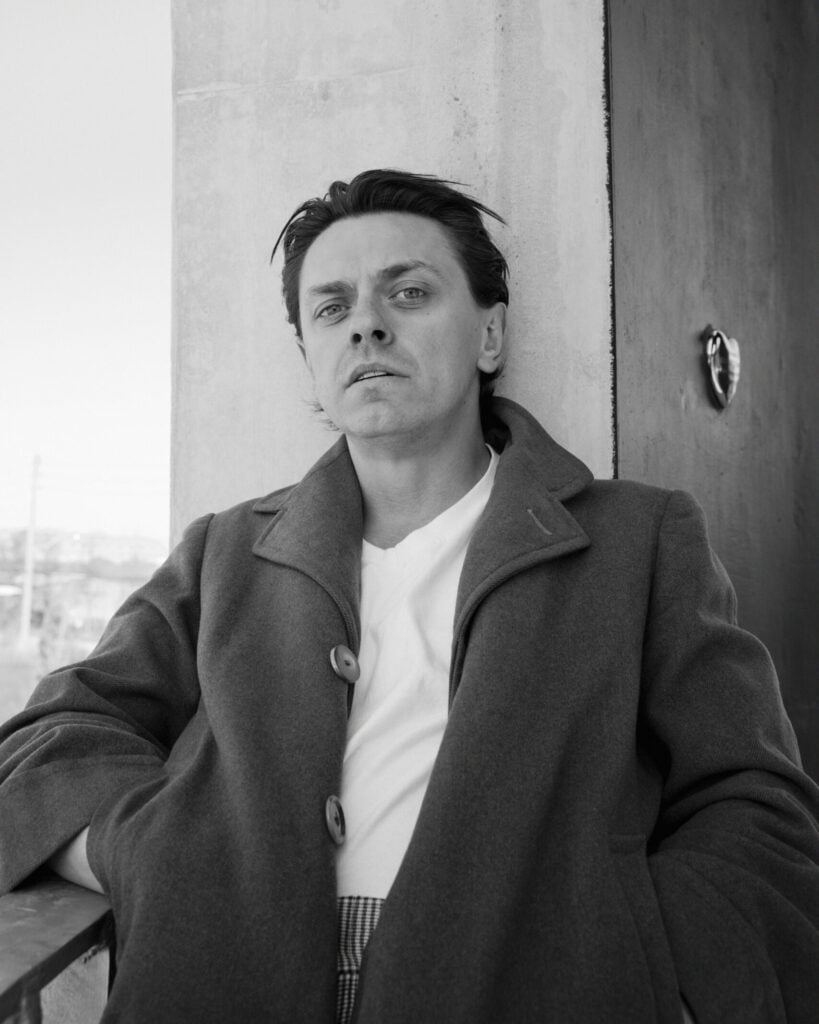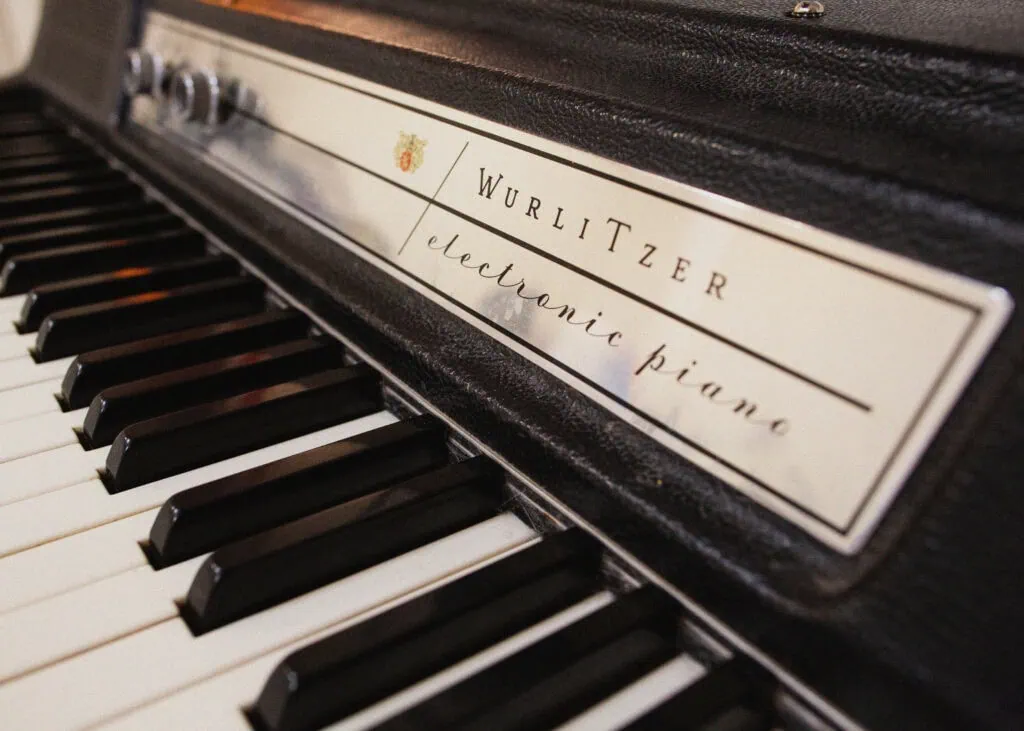Peter Dreimanis’ grandmother, who he called his Nain (pronounced ‘nine’), was of Welsh background, and passed away two Novembers ago, just before her 98th birthday. Both sides of her family were deeply musical, and music was of major importance in their lives as they worked in work camps all around northern Alberta and elsewhere in the country.
“Even when they were living in a shack in a place like Skeena, B.C., they would find a way to get some sort of instrument or radio or something,” Dreimanis says over the phone from Toronto. “It was the first priority of the household.”
It was through his Nain that Dreimanis — who co-fronts July Talk with his partner Leah Fay, recently released the side project album Peter Dreams and MOONRIIVR, and appears in the new Ryan Coogler film Sinners — came to understand the piano. Since this first introduction, which he expands on below, he had the good fortune of happening upon a very special Wurlitzer.

July Talk played their first ever Winnipeg show at the now-defunct Le Garage. While it was sparsely attended, a guy named Pierre LaFreniere offered to put the band up, so they went back to where he lived with his dad. LaFreniere’s dad, George, had a side gig buying, restoring, and selling Hammond organs and Wurlitzers from churches around Minnesota and Manitoba. The entire middle floor of the house was filled.
“Even that first night, I feel like I wrote a couple songs on the Wurlitzer,” Dreimanis says.
“Then each time we’d go back to Winnipeg, we’d usually end up having big parties at Pierre’s house, after parties for the shows,” Dreimanis says. “I feel like there were times where we’d play The Pyramid or something and I would just announce it from the stage, like: ‘OK! Afterwards we’re going to Pierre’s.’ I probably told everyone the address. And it was a real cultural centre of July Talk tours for many years, but it would always end with us staying there, and then in the morning, I’d wake up and get a coffee and stroll into this massive room full of one of a kind instruments, and I always got a song in those moments.”
He eventually got tired of being apart from the instrument, and offered to buy it on a tour headed back to Toronto from Vancouver. They offered him a generous price and his relationship with it has continued to grow. It appears on multiple July Talk recordings, and “Forget Yer Name,” from the Peter Dreams and MOONRIIVR album, was written on it.
“I absolutely rely on it,” Dreimanis says. “It’s almost like a limb of my body. And I’m so grateful to Pierre and George for allowing me to have a closer relationship with it. I feel like I had just as much of a relationship with it when it was in their house, but to have it so close is such a gift.”
“It’s my most cherished possession,” he adds. “It means the world to me.”
How were you introduced to piano?
What comes to mind is our family friend’s sheep farm outside of Edson, Alberta, sitting at the bench with my Nain and her showing me how it worked, you know, her playing bass intervals and me improvising up top. And she would say, “Now on the black keys, now on the white keys.” She just kind of showed me this beautiful language. Then slowly, I think, the school approached my parents and said that they were worried about my motor skills or something, and they recommended that they put me in piano lessons—hippie lady piano lessons to start, and then I worked my way up through conservatory style stuff. But then, you know, I started smoking weed and skateboarding and quit, and just totally stopped relating to music from a teaching aspect, from a rules aspect, and started playing guitar. But there was this real moment, I think in grade 11, when I reapproached piano. I think it was mostly because I fell pretty deep into Leonard Cohen, Tom Waits, Bob Dylan, Joni Mitchell, and Fleetwood Mac. And I was like, “Oh, my God, I can just sit down and play these songs.” It was this total revelation to me that I’d kind of forgotten that I just knew how to play, because I think that I really needed to distance myself from the sort of authoritarian conservatory approach.
When I came back to it, I was like, “Oh, my God, they’re all just buttons.” Leah once said to me, “It’s just a bunch of tiny hammers.” And it was suddenly so playful. I would sit down and learn Blood on the Tracks front to back, and then learn Bone Machine and Mule Variations front to back. And then I could just sit there, and my family was so kind to me in allowing me to be loud. It was right in our living room, my parents would be like, making dinner and carolling. Because it’s a step family scenario, there were four teenagers within three years of age. So, you know, grocery bill off the charts. And I’m playing along to a record on an out of tune piano five hours a day, sneaking out and smoking joints with my brother. I felt I had kind of taken my time away, and then I was coming back to the instrument, and it was no longer an authority over me. It became so playful and just a real place of safety and refuge. A sanctuary of creativity.
What drew you to the piano originally and what draws you to it now?
So, Duncan was sort of like an older brother figure from another one of the families, and he played jazz piano. He also had a badass rock and roll band with his brother Louis, so I think it was mostly looking at him doing it and being like, “Whoa. That is so cool.” And I think more than anything, at the time, I could look at it and understand it, because of my grandmother. She showed me the ropes. Looking at a guitar when I was young was overwhelming, whereas the way that a piano is laid out made sense—you can see how the scales work together and how you can play any song in any key. The claw formations of the hand that you need to do for guitar never really felt quite as much like home.
How has your relationship to keys changed over time?
Now I’m in a weird place with the piano. I did some writing with a guy that I really respect when I was in California, and I played him some of the stuff I wanted to work on and he said, “You wrote all these on piano, right?” And I said, “Yeah.” And he said, “I can tell.” I think it spoke to something that I was already kind of feeling about myself, which is that it’s easy to get caught in a comfort zone as a songwriter. I’m recognizing the need to escape that a bit. On Peter Dreams and MOONRIIVR, a lot of the songs are really old and have been around for quite a long time. And the piano we have here in the house that I bought for Leah for her birthday, or maybe for Hanukkah, its front panel looks like a confession booth in a church. It was a church piano in Scarborough and I always kind of giggle to myself as I’m sitting down, because my songs are often pretty confessional, and it’s where I feel most safe to be honest with myself.
Why is it important to you, to be honest with yourself when you’re writing?
I’ve always been a believer that a song has to feel vital in order to exist. And that’s an “I” statement. I’m not putting that on anybody else. But I feel that if a song doesn’t feel like it has to exist, then you shouldn’t really be asking others to indulge in it. And so often, the way I find that I can make a song feel vital is to put some skin in the game and be honest with myself and share sort of an uncomfortable truth. So a lot of the Peter Dreams record is songs that I sat down at that piano and wrote as a way of shedding uncomfortable and inconvenient feelings and truths. The piano feels very much like a safe place where I can address things I fear.
What is it about the sound of a Wurlitzer that attracts you to them?
Warmth, I think. It’s not an instrument that goes out of its way to have a full spectrum of frequency. It’s more in this sort of low, mid frequency that feels like a fireside. It resonates and it has a beautiful combination of electronic amplification and acoustic—a hammer’s hitting a bell, you know? It’s also a very quintessential July Talk sound. It’s on every July Talk record, heavily. Right from the first song we ever released. I was always so drawn to it, probably mostly from Harry Nilsson. I think that hearing songs like “One,” which I fell in love with from the Magnolia soundtrack initially. And then there’s a song called “Early in the Morning” off of Nilsson Schmilsson, it’s one of the best recordings of all time. You can hear the keys, sort of. They must have mic’d the actual keys so they’ve become percussive, like he’s playing drums with his fingers. It’s really worth a listen, that song. I think that’s the best Wurlitzer recording there is. But, yeah, it’s on all of our records. It’s just such a nice feeling to start a song there.
